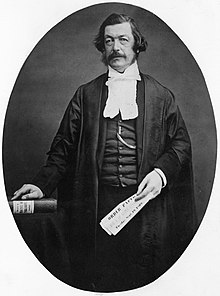Sir Charles Clifford, 1st Baronet
|
The Honourable Sir Charles Clifford |
|
|---|---|

circa 1860
|
|
| 1st Speaker of the New Zealand House of Representatives | |
|
In office 31 May 1854 – 12 December 1860 |
|
| Prime Minister | Henry Sewell |
| Preceded by | Office Established |
| Succeeded by | David Monro |
| Member of the New Zealand Parliament for City of Wellington |
|
|
In office 14 July 1853 – 12 December 1860 Serving with Robert Hart (1853–1855) James Kelham (1853–1855) Isaac Featherston (1855–1860) Sir William Fitzherbert (1855–1858) William Rhodes (1858 – 1860) |
|
| Succeeded by |
William Taylor Isaac Featherson William Rhodes |
| Personal details | |
| Born | 1 January 1813 Lancashire England |
| Died | 27 February 1893 (aged 80 years) London England |
| Political party | Independent |
Sir Charles Clifford, 1st Baronet (1 January 1813 – 27 February 1893) was a New Zealand politician. He was the first Speaker of the New Zealand House of Representatives, serving from 1854 to 1860.
Clifford was born in Mount Vernon, Scotforth, Lancashire, England. Related to the Barons Clifford of Chudleigh, he came from a wealthy background, and his parents were well-connected. After attending Stonyhurst College, Clifford set out for New Zealand with his cousin William Vavasour, leaving in 1842. Arriving in the New Zealand Company settlement of Wellington, the two established a land, shipping and commissions agency with finance from their parents. They later expanded their holdings, establishing a considerable number of farming ventures. Clifford also worked in partnership with Frederick Weld, another cousin. At the same time, he was active in the Wellington militia, attaining the rank of Captain. He became a Justice of the Peace in 1844 and a magistrate in 1846.
On 24 May 1854 when the 1st New Zealand Parliament convened, Clifford was unanimously elected Speaker (having previously been Speaker for the Wellington Provincial Council). He remains the youngest ever Speaker, having been appointed at the age of forty-one. He was Member of the New Zealand Parliament for the City of Wellington from 1853 until his retirement as its speaker in 1860.
...
Wikipedia
